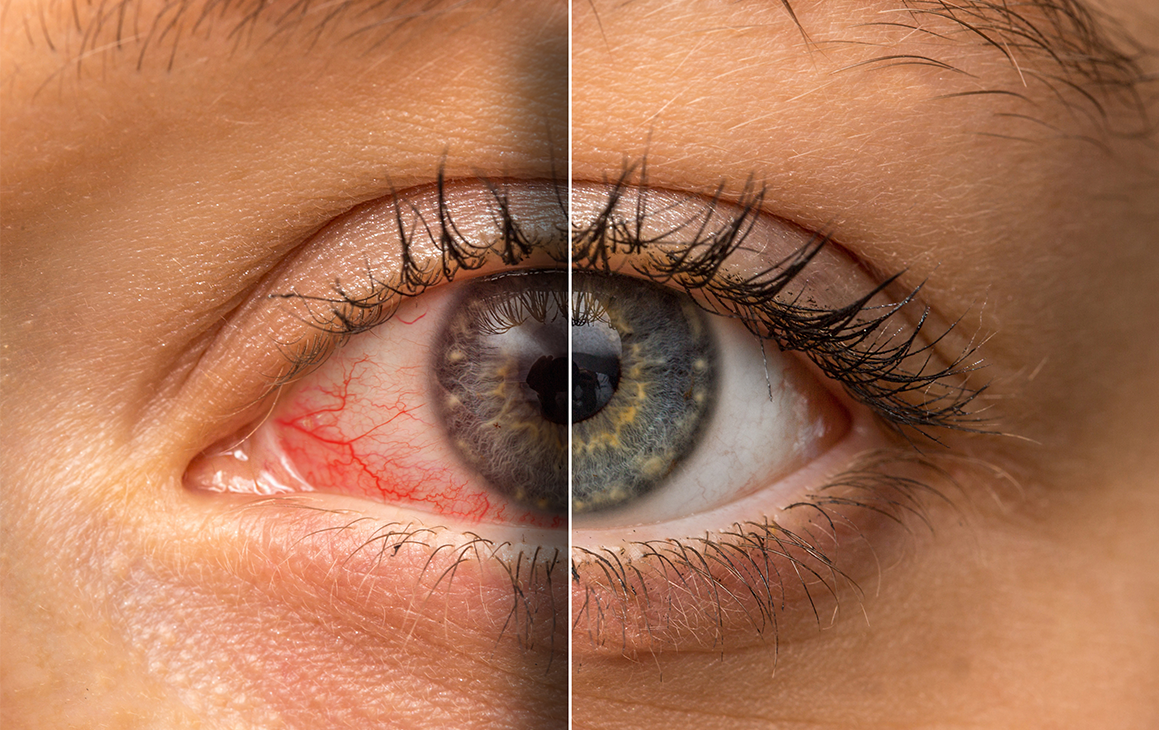Seasonal allergic conjunctivitis is actually the most common type of ocular (eye or vision-related) allergy. As its name suggests, it is associated with specific pollens that release spores during particular seasons.
In Canada, tree pollen peaks in the springtime, in late April and May, though it can be found in some areas as early as February. Grass pollen peaks in the summer, from late-May to mid-July, and Ragweed pollen can stay as late as September. So even though it’s called seasonal, it’s an issue for more than half the year!
This leads us to the question - what exactly do these spores and pollens do? And why do some people have instant and adverse reactions to it?2
It’s because of something in our eyes called conjunctiva, which is a clear layer of tissue lining our eyelids and covering the white of our eyes. Allergic conjunctivitis occurs when the conjunctiva becomes swollen or inflamed due to a reaction with an irritant like pollen, dust mites, pet dander, mold, or other allergy-causing substances.
An allergy3 is basically our body’s reaction to something that it recognizes as foreign or dangerous, and wants to get rid of. This makes allergic reactions a very important part of our body’s immune defence system. When we’re allergic to something, our body’s defences react and produce potent chemicals such as histamine, which is primarily responsible for watery, itchy eyes and many other typical allergic symptoms.
What are the symptoms of Seasonal Allergic Conjunctivitis?
Symptoms of allergic conjunctivitis may vary from very mild to very severe. Itching is the most common symptom. Other symptoms also include4
- Urge to rub eyes
- Red eyes
- Watery or white, stringy mucus discharge
- Swollen eyelids
These symptoms may sometimes be accompanied by nasal symptoms such as a runny or itchy nose, or sneezing.
What sometimes happens is that the white area5 immediately around the coloured part of the eyes can also swell, causing tiny bumps visible on the surface of the eye. Normally thin eyelid skin can also be affected, becoming thick, swollen, itchy, or red. Children may frequently rub or roll their eyes. They may even tightly squeeze or excessively blink to relieve the itchiness.
So, after understanding what the disease is, how its caused, and how our body responds, we have to look at what we should do in case we or someone we know develops a case of seasonal allergic conjunctivitis.
That’s where CromolynTM Eye Drops come in. These Eye drops (cromolyn sodium) are a non-prescription drug intended to be used for the prevention of eye symptoms of seasonal allergic conjunctivitis.
How do CromolynTM Eye Drops Work?
During an allergic reaction, various substances are released by certain cells in our eyes, called mast cells. The substances released by these cells affect our eyes in multiple different ways – blood vessels, nerves, and glands – causing redness, itching and watery eyes. CromolynTM Eye Drops acts on the mast cells to prevent them from releasing the substances that cause these problems.
Who can benefit from these Eye Drops?
CromolynTM Eye Drops are suitable for adults and children 5 years of age or older: 1-2 drops in each eye 4 times a day at regular intervals is sufficient for most patients. CromolynTM is non-drowsy, effective prevention of allergic conjunctivitis! Cromolyn™ should be used continually throughout the patient's usual allergy season, even when the patient is free of symptoms. Continued use could help ensure the patient remains symptom-free.
This product may not be right for you. Please read and follow the label before use for a list of contraindications, warnings, precautions, and adverse reactions.
Reference:
- Kellogg Eye Centre – University of Michigan Health -
https://www.umkelloggeye.org/conditions-treatments/seasonal-allergic-conjunctivitis-hayfever - Mount Sinai -
https://www.mountsinai.org/health-library/diseases-conditions/allergic-conjunctivitis - The University of Illinois College of Medicine -
https://chicago.medicine.uic.edu/departments/academic-departments/ophthalmology-visual-sciences/our-department/media-center/eye-facts/allergic-conjunctivitis/ - Johns Hopkins Medicines -
https://www.hopkinsmedicine.org/health/conditions-and-diseases/allergic-conjunctivitis - American Association for Paediatric Ophthalmology & Strabismus -
https://aapos.org/glossary/allergic-conjunctivitis


